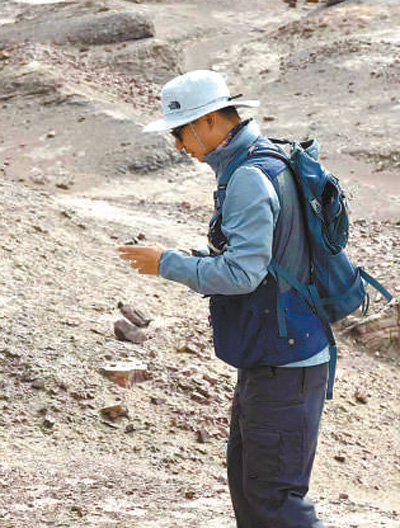Yunnan University researcher lauded in People's Daily report
A top researcher at Yunnan University, or YNU – located in Kunming, capital of Southwest China's Yunnan province – was recently praised in a newspaper article published by the People's Daily.
The article on March 3 was about work undertaken by Feng Zhuo – head of the early biological evolution and paleoecology research team at the Institute of Paleontology, at YNU – and that of his colleagues.

Feng collects plant fossil specimens in the field. [Photo/ynu.edu.cn]
The team is understood to have made a series of internationally groundbreaking findings in the study of early Cambrian biological body configurations, nervous systems, circulatory systems, the evolution of important seed plants and the reconstruction of terrestrial ecosystems.
There are currently 8,080 drawers in the ancient plant fossil specimen library at the institute, storing more than 40,000 plant fossil specimens from various geological periods including the Cambrian and Jurassic periods. All of them were collected in the field by Feng and his team.
Restoring fossils is widely said to be very time-consuming, ranging from hours to days for a single specimen.
After the restoration, Feng then adopts different research methods, such as low-power microscope observations or high-power microscope research, according to the different fossil types.
Feng's undergraduate major was petroleum geology, but after taking a course in paleontology and geohistory he was hooked, becoming fascinated with paleontology. Later, he was admitted to the Nanjing Institute of Geology and Palaeontology – in the Chinese Academy of Sciences – to study for a doctorate.
Since getting his doctorate in 2008, Feng has published findings on seven new genuses and 17 new species, as well as identified nearly 20 ancient plant species.
In recognition of his contributions to the field of paleobotany, Feng was appointed the National Natural Science Foundation of China Outstanding Young Scientist in 2014, becoming the first young scientist in China's paleobotany to receive the accolade.
All rights reserved. Presented by China Daily. 滇ICP备12004993号-2








